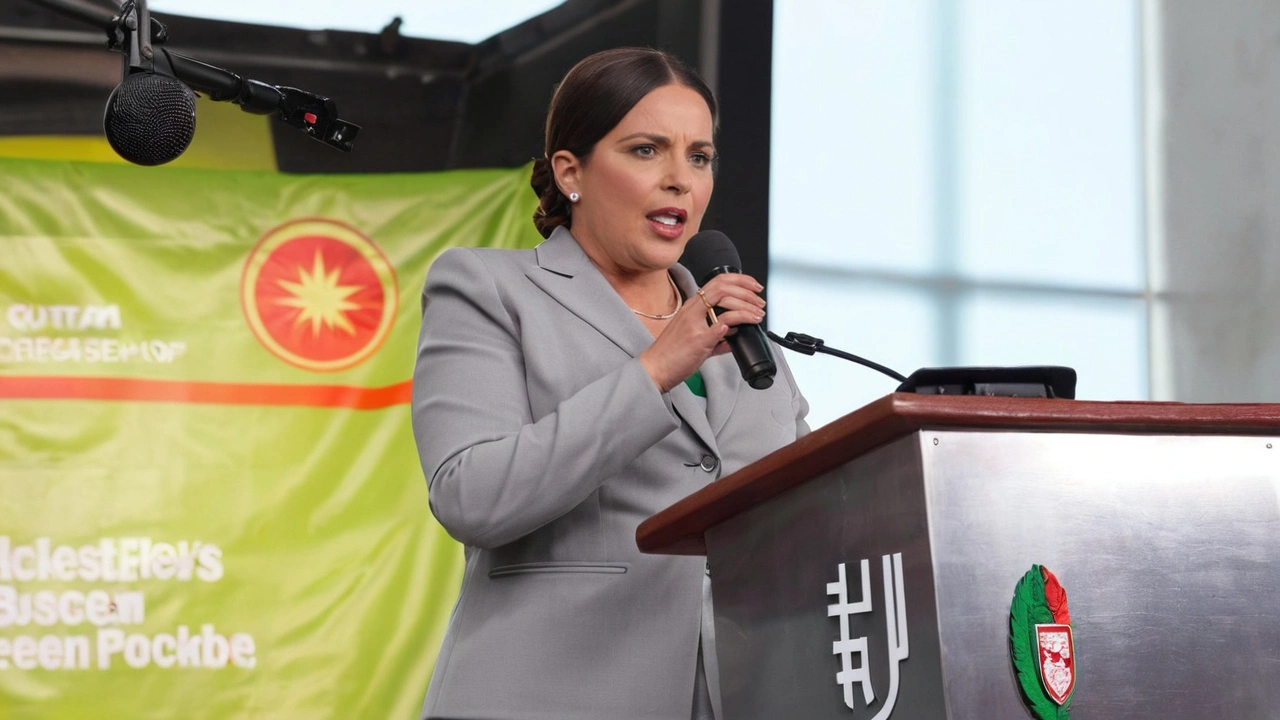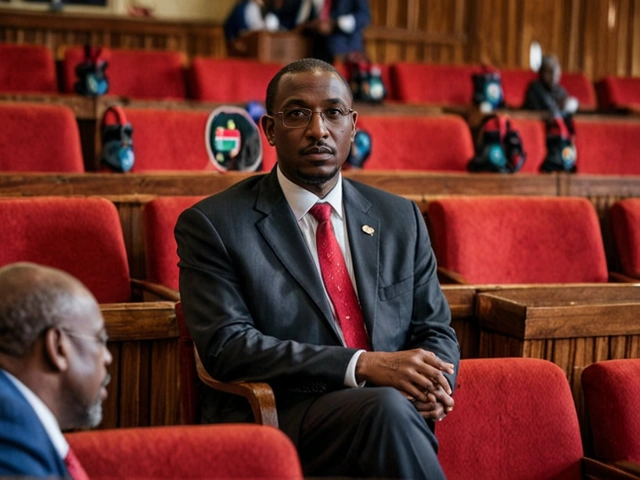President William Ruto’s recent submission of Cabinet nominees to Parliament has sparked both intrigue and speculation, particularly due to the conspicuous absence of Rebecca Miano's name. Initially tapped for the influential position of Attorney General on July 19, Miano's exclusion from the vetting list has left many questioning the reasons behind this unexpected move. The list, which comprises 10 nominees destined for different ministerial portfolios, was officially conveyed to Parliament for vetting, a crucial step in the approval process.
The omission of Miano, whose nomination had garnered considerable attention and speculation, was unexpected. Her name had been among the significant appointments anticipated by political observers and the general public alike. The role of Attorney General is pivotal in any government, providing essential legal advice and having substantial influence over legal and legislative matters.
The individuals whose names did make the list include some well-known figures, such as Aden Duale. Formerly holding the Defence docket, Duale has now been nominated for the Ministry of Environment, Climate Change, and Forestry. Such a shift indicates a re-alignment in the tasks deemed critical by the administration, signifying possibly a newfound emphasis on environmental issues amid the global climate crisis.
Other notable nominees include Soipan Tuya, Kithure Kindiki, Davis Chirchir, Alice Wahome, Eric Muriithi Muuga, Margaret Nyambura Ndung’u, Debra Mlongo Barasa, Julius Migos Ogamba, and Andrew Mwihia Karanja. These names represent a blend of experienced political hands and new faces, showcasing a balance between continuity and fresh perspectives in governance.
Speaker Moses Wetang'ula has confirmed that the names and curriculum vitae of these nominees will now be forwarded to the Committee on Appointments for consideration. Under parliamentary procedures, the committee has 28 days to table its report in the House. The vetting process involves an in-depth scrutiny of the nominees' qualifications, past performance, and overall suitability for their designated roles.
The absence of Miano’s name, in particular, has raised eyebrows. Known for her legal acumen and previous roles in both corporate and government settings, Miano’s disqualification leaves a gap that is bound to resonate in legal circles and beyond. Speculation abounds as to the rationale behind this decision, with theories ranging from political maneuvering to possible qualms about her past record or vetting challenges.
Public reactions have been mixed. Some citizens and political analysts see the move as a strategic recalibration by Ruto’s administration, intending to streamline leadership and perhaps address emerging issues decisively. Others, however, express concern about the apparent inconsistency in leadership choices and the potential for undercurrents of political plays affecting critical appointments.
As the vetting process proceeds, the focus will be on the other nominees who now stand to undergo rigorous scrutiny. Aden Duale’s shift to the Ministry of Environment, Climate Change, and Forestry, for instance, is already a talking point. Duale, an ardent supporter of Ruto, will be tasked with navigating critical issues related to sustainability, ecological preservation, and climate policies, sectors that are gaining urgent prominence globally.
Soipan Tuya, another significant nominee, is expected to play a pivotal role if confirmed. Her designated ministry's future policies could have far-reaching implications on national development and social welfare. Kithure Kindiki, Davis Chirchir, and the others also bring a blend of experience and expectations, alongside the ever-present scrutiny that accompanies public service roles.
The parliamentary Committee on Appointments will undoubtedly have its hands full over the coming weeks, tasked with meticulously examining each nominee’s background, plans, and potential challenges they might face in their roles. Given the diverse and strategic importance of each ministry, comprehensive vetting is not only prudent but necessary to ensure a capable and efficacious leadership framework.
Furthermore, the broader political implications of these appointments will be closely watched. As Kenya navigates through political, economic, and social challenges, the quality and preparedness of its leadership at various levels remain under the microscope. Ensuring that those appointed are equipped to lead effectively is a crucial responsibility of both the administration and Parliament.
In the midst of these developments, Rebecca Miano’s exclusion remains a significant twist in the narrative. Whether this decision will turn out to be a temporary recalibration or a more permanent sidestep remains to be seen. For now, the focus stays on the 10 nominees as they prepare to face the rigorous vetting process and the subsequent responsibilities their roles will demand.






Hina Tiwari
July 24, 2024 AT 01:17 AMI really feel for anyone caught in the middle of this vetting saga, especially when a name like Miano’s disappears without a clear note. It looks like the process is tighter than usual, maybe they’re double‑checking legal backgrounds. Folks on the ground are probably wondering if there’s a hidden reason behind the shift. Hope the committee clarifies soon, it would help a lot of people who are waiting for answers.
WILL WILLIAMS
July 24, 2024 AT 02:13 AMThis twist adds a splash of drama to the cabinet shuffle-watch how the climate docket lights up now! Keep the energy high, Kenya’s next moves could be game‑changing.
Barry Hall
July 24, 2024 AT 03:36 AMGot it, let’s see how the vetting rolls out 😊
abi rama
July 24, 2024 AT 05:00 AMReading through the list, it’s clear the administration is trying to balance experience with fresh faces. The shift of Duale to environment shows climate is climbing the agenda. Meanwhile, the exclusion of Miano might hint at internal debates we’re not privy to. Regardless, the upcoming committee hearings will be crucial for transparency. Let’s stay optimistic and keep an eye on the outcomes.
Megan Riley
July 24, 2024 AT 06:23 AMWow, what an interesting lineup, and wow, the missing piece! It’s like a puzzle where one corner is just… gone! I'm thinking the legal community is definitely feeling the ripple, especially after hearing about Miano’s omission, it’s a real head‑scratch! The shift in portfolios shows the Ruto team might be gearing up for some serious policy pivots-environment, climate, all that jazz. Let’s not forget the seasoned players like Duale and Kindiki, they bring a ton of experience, which is super valuable. And hey, whatever the reason, the vetting process will reveal the real story, so stay tuned!
Lester Focke
July 24, 2024 AT 07:46 AMWhile Ms. Riley’s enthusiasm is commendable, one must consider the procedural rigor that underpins such appointments. The omission of a high‑profile legal figure invariably raises questions about internal vetting criteria.
Naveen Kumar Lokanatha
July 24, 2024 AT 10:33 AMLooking at the broader picture, the Kenyan cabinet reshuffle is more than just a list of names; it reflects the political calculus that President Ruto must navigate. The inclusion of seasoned veterans like Duale in the environmental ministry signals a strategic alignment with global climate commitments. At the same time, the exclusion of Rebecca Miano, a figure with notable corporate and legal experience, suggests potential internal disagreements or perhaps concerns about past engagements. Historically, Kenya has seen similar moves where key nominees were held back for further scrutiny, often due to legislative push‑back or public outcry. The Committee on Appointments now faces a delicate balancing act-ensuring each nominee meets the constitutional standards while also maintaining political cohesion. Transparency in this process is crucial because it builds public trust, especially when big decisions affect the nation’s legal and environmental policies. It’s also worth noting that the vetting period of 28 days is not just a formality; it offers a window for rigorous examination of each candidate’s track record. In the case of Miano, if there were concerns about her past corporate roles, those might be examined under conflict‑of‑interest provisions. Moreover, the presence of fresh faces like Soipan Tuya could bring new perspectives that the administration wants to highlight. The interplay between experience and innovation is a recurring theme in Kenyan governance. As the hearings commence, stakeholders from civil society, legal circles, and even the business community will likely voice their opinions, adding layers to the discourse. This multiplicity of voices helps ensure that the final appointments are not merely political hand‑picks but also reflect a broader consensus. Ultimately, the outcome of this vetting will set the tone for Ruto’s policy agenda over the next term, influencing everything from climate action to legal reforms. Therefore, all eyes should remain on the committee’s report, which will be the definitive indicator of where the administration stands on these critical issues.